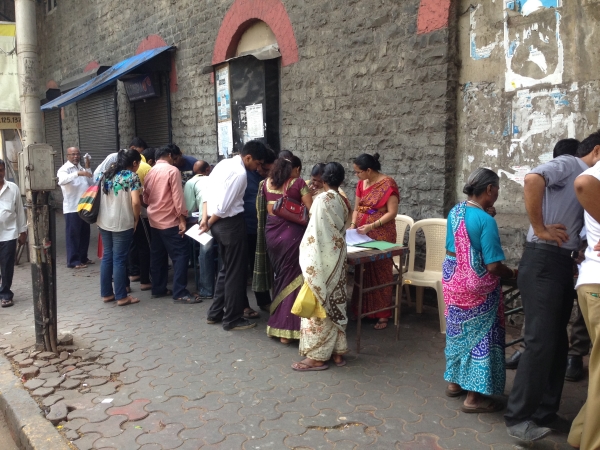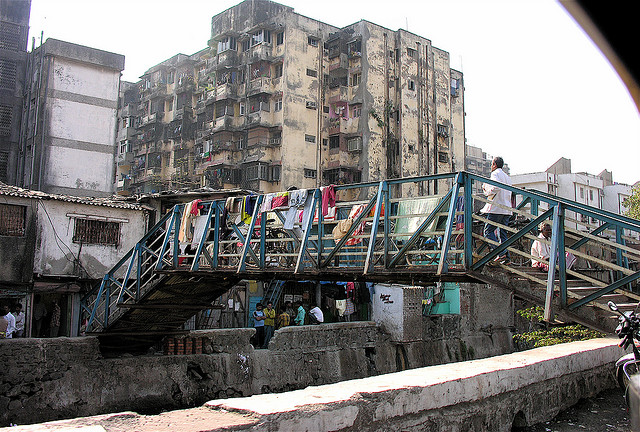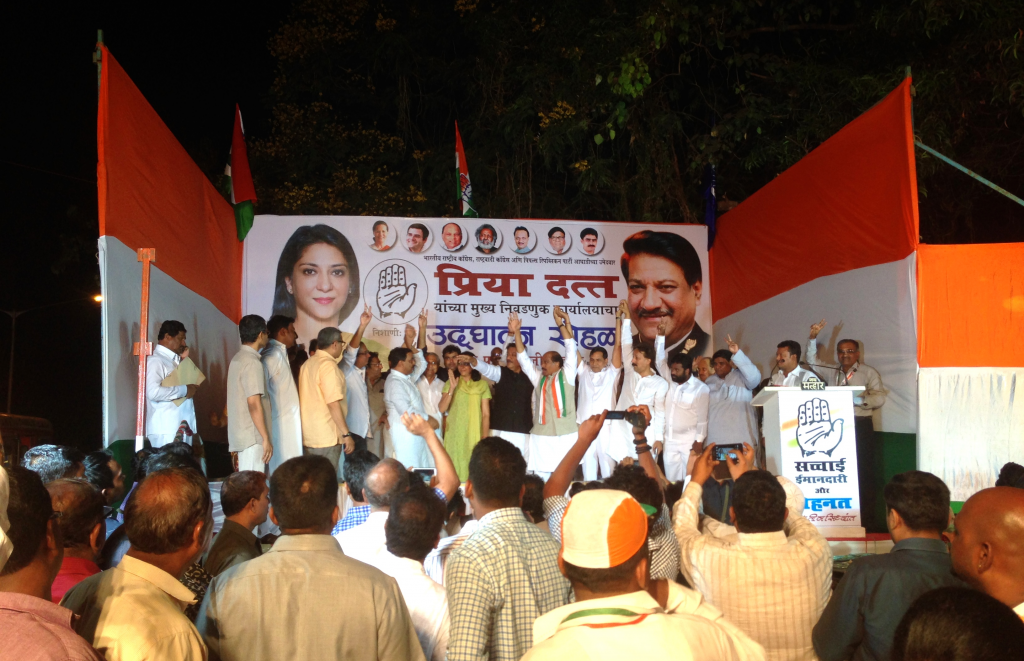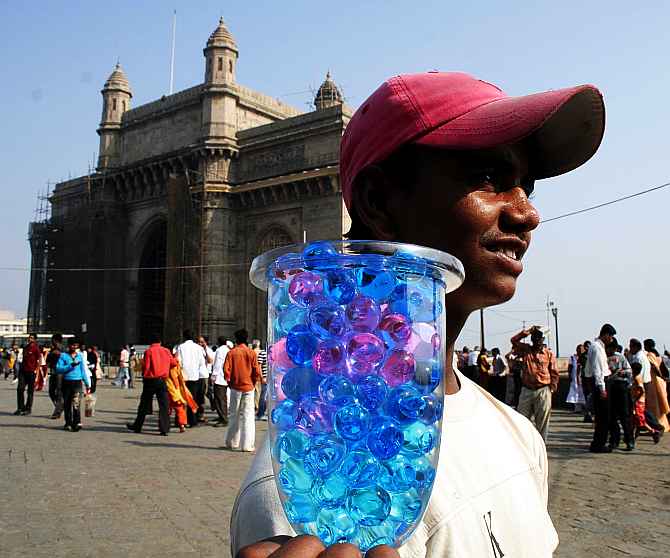
The election hung heavy in the air over the wealthy tourist hot-spot of Colaba Causeway in the Mumbai South constituency. Everyone had an opinion, from businessmen to beggars, about who should form the next government in India and what priorities it should have.
It was often others who started the conversation – would I like to buy a map of Mumbai? Or perhaps a scarf – genuine cashmere? But most people were willing – after some haggling – to give their views on what they want from the candidates they plan to vote for on April 24.
Hitesh Chhabria is the owner of Immediate Boutique and is rooting for the Congress. “People are scaring other people into voting for Narendra Modi,” he said. “He is working the media well.”
Chhabria said he could see the difference a Congress government had made to the area, and wanted it to continue. “I’ve seen India 10 years ago, and I’ve seen India now. There’s a lot of difference,” he said. But he did have his reservations. “Politics is politics, people want to fill up their pockets,” he said.
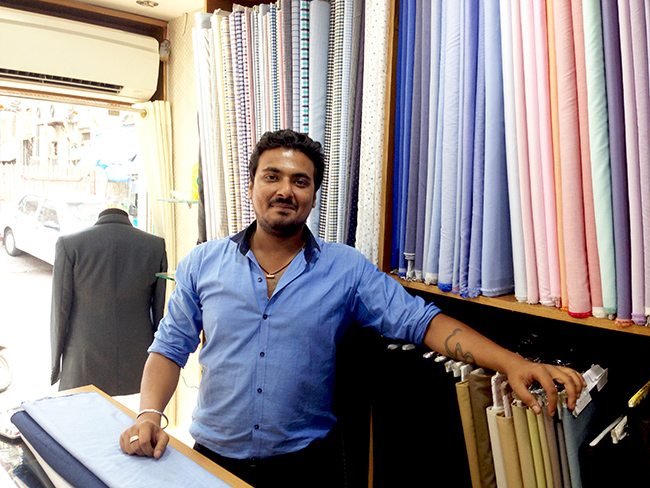
Would he ever think about Arvind Kejriwal’s Aam Aadmi Party as an alternative?
“Maybe,” he said. “The AAP is a good thing. But Kejriwal is so small, and they are not letting him jump.”
A South African man who was in the shop chipped in to say he didn’t know much about Indian politics, but there was only one candidate he noticed thanks to wall-to-wall advertising: “The guy with the beard.”
As we spoke, several dozen AAP supporters, wearing their trademark white caps and waving the party’s symbolic brooms in the air, marched down the street, loudly telling people to give their party a chance in the election. Diwan Chandres, who works for an internet service provider, was part of the procession. “People are very supportive here,” he said. “Everyone is against corruption.”
But does a young party have a genuine chance of winning here? “We have a 99 per cent chance of winning,” he said. That much? “Scientists, businessmen, students, taxi drivers, hawkers and doctors – all over India, people want the AAP and don’t want corruption.”
The AAP candidate, former Royal Bank of Scotland banker Meera Sanyal, might seem a strange choice for the aam aadmi [common man]. Her website even includes a quotation from Ayn Rand, a favourite of the right-wing Tea Party in the US. But that didn’t seem to make a difference to many on Colaba Causeway. In fact, the AAP was the most visible party on the road, with dozens of street merchants proudly wearing the official cap of the party.
Further along the road, Preety Virle was behind the counter at the Himalaya Wellness health shop. “All the parties are the same,” she said. “But you have to vote — that’s our right. I would like to try the Bharatiya Janata Party. We’ve had Congress for 10 years, but no change. I want to get inflation down. For working class people like me, our salaries are so low, we find it very difficult to cover our basic needs.”
Another person finding life difficult was Laxmi Jadhu, a beggar. She was carrying her small baby as she asked people to buy her milk powder among the busy market stalls. “I will vote, but I don’t know for whom,” she said. “I just hope the new government will do more for poor people. But I don’t know who will do that.”
Dipa Tambe, from the John Player clothing shop, said he just wanted to see some results from politicians on issues like pollution in the city. “Some of them are cheaters, some are good,” he said. I asked him to name names. “The Congress is good, and AAP have good people,” he said. “But we will only know after the election.”
True to the entrepreneurial spirit of the street, several people I spoke to said they had no opinion at all about the election — but that they might develop one if I bought whatever they were selling.
Two men, who asked not to be named, said their stall had been confiscated by the police that morning — and were angry that, they believed, the only way to get their stock back would be to “pay under the table”. They did not want to be drawn into a discussion about who they would vote for, but said corruption was a big issue for them.
“I will tell you everything if you buy us some beers,” one of them said. I thought that perhaps that wasn’t the best way to get the story, and declined.
It was starting to get late, so I got into a cab and went to Marine Drive to speak to some of the people lining the bay, sitting on the wall taking selfies against the sunset and buying fruit juice from street vendors.
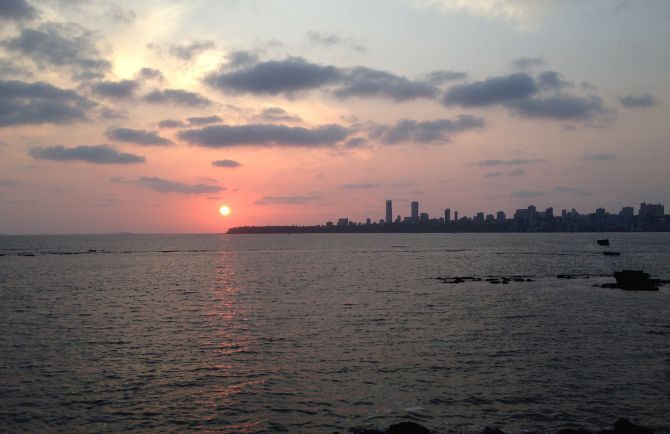
Mohammed Asif Gandhi, a young mechanical engineer, was tapping away at his laptop when I interrupted him. “I’m not very interested in the election,” he said. “We just need the right sort of people, but so far it hasn’t been encouraging.”
He was annoyed the focus on the election seemed to be negative campaigning. “They need to do the job properly, but many politicians don’t focus on the job. They just try to focus on the negative points of others.” Gandhi added his vote would go to a person, not a party — but he preferred to keep exactly who that was to himself.
Also wishing to keep their voting intentions to themselves were Sandhya and Brij Gupta, both government workers. Sandhya said she was disappointed that more people didn’t take the time to vote, but was happy turnout was higher this time round.
“Everyone should do their best,” she said. “But politicians shouldn’t forget that they are chosen by the people.”
Photographs: Patrick Ward
This story was also published in Rediff.com, our media partner
